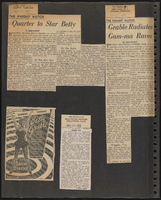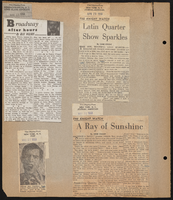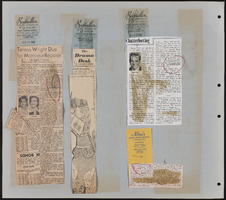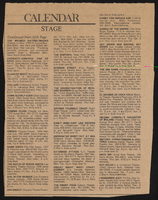Search the Special Collections and Archives Portal
Search Results
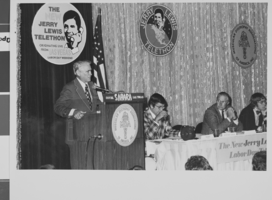
Photograph of Mayor Oran K, Gragson speaking at the pre-telethon production meeting, Las Vegas, Nevada, 1974
Date
1974
Archival Collection
Description
Las Vegas Mayor Oran K. Gragson (at the podium) addressing the general session at the pre-telethon production meeting for the Jerry Lewis Muscular Dystrophy Telethon at the Sahara Hotel and Casino. Oran Kenneth Gragson (February 14, 1911 – October 7, 2002) was an American businessman and politician. He was the longest-serving mayor of Las Vegas, Nevada, from 1959 to 1975. Gragson, a member of the Republican Party, was a small business owner who was elected Mayor on a reform platform against police corruption and for equal opportunity for people of all socio-economic and racial categories. Gragson died in a Las Vegas hospice on October 7, 2002, at the age of 91. The Oran K. Gragson Elementary School located at 555 N. Honolulu Street, Las Vegas, NV 89110 was named in his honor. The Jerry Lewis MDA Labor Day Telethon was an annual telethon held each Labor Day in the United States to raise money for the Muscular Dystrophy Association (MDA). The show was founded and hosted by actor and comedian Jerry Lewis, who hosted the broadcast from its 1966 inception until 2010. The history of MDA's telethon dated back to the 1950s, when the Jerry Lewis Thanksgiving Party for MDA raised funds for the organization's New York City area operations. The telethon was held annually on Labor Day weekend beginning in 1966, and would raise $2.45 billion for MDA from its inception through 2009. The telethon aired up to 21½ hours, starting on the Sunday evening preceding Labor Day and continuing until late Monday afternoon on the holiday itself. MDA called its network of participating stations the "Love Network". The show originated from Las Vegas for 28 of the years it was broadcast. Beginning in 2011, coinciding with Lewis's controversial departure, MDA radically reformatted and shortened the telethon's format into that of a benefit concert, shortening the length of the special each successive year. Successive telethons from 2012 to 2014 renamed the show as the MDA Show of Strength and further cut its airtime. The 2012 edition was reduced to three hours as a primetime-only broadcast. The 2012 edition did not refer itself as a "telethon". The 2013 Show of Strength discontinued the long-standing format of being syndicated to individual stations of varying network affiliation and aired on a major national network instead of being syndicated to individual stations, airing on ABC on Sunday, September 1, 2013, and being reduced to two hours. While the 2012 edition did not refer itself as a "telethon", it referred itself as such for the 2013 edition. The final edition, for 2014, aired on ABC on August 31, again as a two-hour special beginning at 9PM ET/PT. This was the final edition for the telethon, as it was announced on May 1, 2015 that the MDA would be discontinuing the annual event.
Image
Duy Ngyuen (Asian Community Development Council) oral history interview conducted by Magdalena Martinez: transcript
Date
2022-01-14
Archival Collection
Description
From the Lincy Institute "Perspectives from the COVID-19 Pandemic" Oral History Project (MS-01178) -- Community organization interviews file.
Text
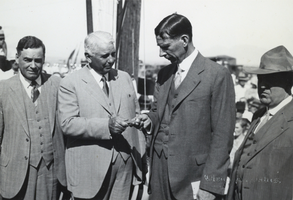
Photograph of Carl Gray handing Ray Lyman Wilbur the first railroad spur spike for Hoover Dam, circa early 1930s
Date
1930 to 1933
Archival Collection
Description
Black and white image of several prominent figures, in front of a crowd outdoors. From left to right: Governor Balzar of Nevada; Carl Gray, President of Union Pacific Railroad Company; Ray Lyman Wilbur, Secretary of the Interior; Governor of Colorado (possibly Edwin C. Johnson). Gray is handing Lyman the first spike to be driven for the spur line to Boulder Dam. Note: Boulder Dam was officially renamed Hoover Dam in 1947.
Image
Brookman, Eileen
Eileen (Milstein) Brookman (1921-2004) was member of the Nevada Assembly from 1967-1977 and 1987-1990. Small in stature but nicknamed "Queenie" by her admirers, she advocated passionately for the rights of persons with disabilities, minorities, people with low incomes, women, and especially the elderly. Brookman entered state politics in 1962 when she was appointed Indian Commissioner by Governor Grant Sawyer.
Person
Pagination
Refine my results
Content Type
Creator or Contributor
Subject
Archival Collection
Digital Project
Resource Type
Year
Material Type
Place
Language
Records Classification

